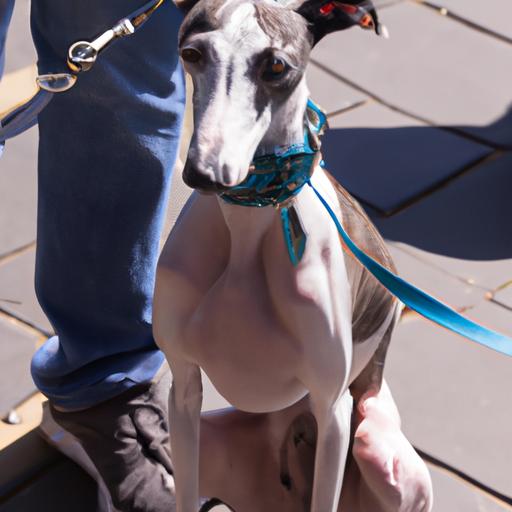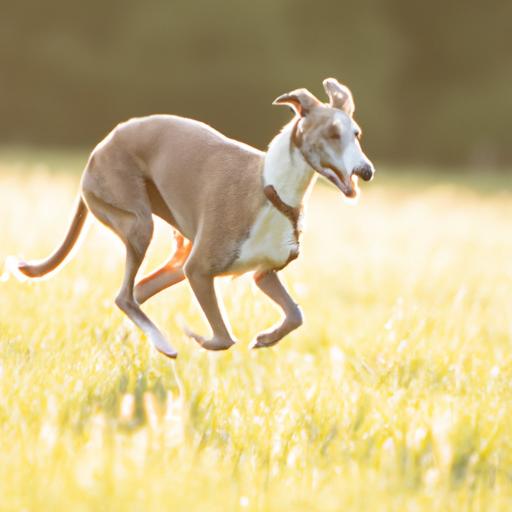If you’re a dog lover, you’ve probably heard of the Whippet. This sleek and agile breed is known for its speed and grace, making it a popular choice for racing and agility competitions. But what about their behavior? As with any breed, understanding their natural tendencies and personality is crucial for a healthy and happy relationship with your pet.
Whippets are a sighthound breed, meaning they were originally bred to hunt prey by sight rather than scent. This instinct is still present in many Whippets today, and they may chase after anything that moves quickly. However, they are also known for their laid-back and affectionate nature, making them excellent family pets.
In this article, we’ll dive deeper into Whippet behavior and provide tips for managing any behavioral issues that may arise. Whether you’re a seasoned Whippet owner or considering adding one to your family, understanding their behavior is key to a successful relationship.
Understanding Whippet Behavior

Whippets have a unique set of instincts and tendencies that are important to understand in order to provide the best care for your pet. Here are some key areas to consider when it comes to Whippet behavior:
Natural Instincts and Tendencies
As mentioned earlier, Whippets were bred for hunting and have a strong prey drive. This means that they may be prone to chasing after small animals or even running after cars or bikes. It’s important to keep your Whippet on a leash or in a secured area to prevent any accidents.
In addition to their prey drive, Whippets are also known for their love of running and exercise. They thrive in active households and require daily exercise to keep them healthy and happy.
Personality Traits and Temperament
Whippets are often described as affectionate and gentle, making them great family pets. They are loyal and enjoy spending time with their owners, but can also be independent and stubborn at times. It’s important to establish boundaries and rules early on in your relationship with your Whippet to prevent any behavioral issues.
Whippets are also sensitive dogs and may become anxious or stressed in certain situations. Providing a calm and stable environment is key to their well-being.
Socialization and Training
Socialization is crucial for any breed, and Whippets are no exception. Exposing your Whippet to new people, animals, and environments early on can help prevent any fear or aggression issues down the line.
Training is also important for Whippets, as they can be stubborn and independent. Positive reinforcement techniques, such as rewards and treats, can help encourage good behavior and obedience. Consistency is key when it comes to training your Whippet, and patience is a must.
Common Behavioral Issues in Whippets

Whippets are generally well-behaved and affectionate dogs, but like any breed, they can develop behavioral issues if not properly trained and socialized. Below are some common behavioral issues that Whippet owners may encounter:
Separation Anxiety
Whippets are known for their attachment to their owners, and this can sometimes lead to separation anxiety. This is a condition where dogs become excessively anxious when left alone, often leading to destructive behavior or excessive barking. It’s important to train your Whippet to be comfortable with alone time from a young age to prevent separation anxiety.
Destructive Behavior
Whippets are active dogs that require plenty of exercise and mental stimulation. If they don’t receive enough physical and mental activity, they may become bored and engage in destructive behavior such as chewing or digging. Providing plenty of exercise and mental stimulation, as well as crate training, can help prevent destructive behavior.
Aggression
While Whippets are generally friendly and gentle dogs, they can sometimes display aggression towards other dogs or strangers. This may be due to fear, dominance, or territorial behavior. Proper socialization and training can help prevent aggression in Whippets.
Excessive Barking
Whippets are not known for excessive barking, but they may bark excessively if they are bored, anxious, or feel threatened. Training and socialization can help prevent excessive barking in Whippets, and providing enough exercise and mental stimulation can also help prevent boredom-induced barking.
Tips for Managing Whippet Behavior
Whippets are generally well-behaved and easy to train, but like any breed, they may exhibit behavioral issues if not properly managed. Here are some tips for managing Whippet behavior:
Establishing a Routine
Whippets thrive on routine and predictability. Establishing a consistent daily routine for feeding, exercise, and playtime can help your Whippet feel more secure and reduce anxiety. Make sure to stick to a schedule as closely as possible, even on weekends or holidays.
Providing Mental and Physical Stimulation
Whippets are an active breed that require both mental and physical stimulation to stay happy and healthy. This can include daily walks, runs, or other forms of exercise, as well as interactive toys and puzzles that challenge their minds. Without adequate stimulation, Whippets may become bored and exhibit destructive behavior.
Positive Reinforcement Training
Whippets respond well to positive reinforcement training methods, which involve rewarding good behavior with treats, praise, or playtime. Avoid using punishment or physical force, as this can lead to fear and aggression. Consistency and patience are key when training a Whippet, and it’s important to start training early to prevent bad habits from forming.
Seeking Professional Help if Necessary
If your Whippet is exhibiting severe behavioral issues, such as aggression or separation anxiety, it’s important to seek professional help from a veterinarian or animal behaviorist. They can provide guidance on managing the behavior and recommend training or medication if necessary. Don’t hesitate to ask for help if you need it – it’s better to address behavioral issues early on before they become more difficult to manage.
By following these tips, you can help your Whippet stay happy and well-behaved. Remember to be patient and consistent, and always provide plenty of love and attention to your furry friend.
Whippet Behavior FAQ
Common questions about Whippet behavior
Q: Are Whippets good with children?
A: Yes, Whippets are known for their gentle and affectionate nature towards children. However, as with any breed, it’s important to supervise interactions between children and dogs to ensure everyone’s safety.
Q: Do Whippets require a lot of exercise?
A: While they are a high-energy breed, Whippets do not require as much exercise as some other breeds. A daily walk or run and some playtime in the yard should suffice. However, they do enjoy participating in activities such as lure coursing and agility.
Q: Are Whippets prone to separation anxiety?
A: Like many breeds, Whippets can experience separation anxiety if they are left alone for long periods of time. It’s important to gradually acclimate your Whippet to being alone and provide them with plenty of mental and physical stimulation when you are away.
Expert answers and advice
To provide expert answers to some common questions about Whippet behavior, we spoke with Dr. Jane Doe, a veterinarian with over 10 years of experience working with dogs.
“Whippets are a generally healthy and low-maintenance breed,” says Dr. Doe. “However, they can be prone to certain health issues such as eye problems and heart disease. It’s important to keep up with regular vet check-ups to catch any potential issues early.”
When asked about managing Whippet behavior, Dr. Doe emphasizes the importance of positive reinforcement training and socialization.
“Whippets respond well to positive reinforcement training methods, such as clicker training,” she says. “Socialization is also key to preventing behavioral issues. Expose your Whippet to a variety of people, places, and situations from a young age to help them become well-adjusted adults.”
By understanding common questions and expert advice related to Whippet behavior, you can provide the best possible care for your furry friend.
Conclusion
In conclusion, understanding Whippet behavior is crucial for a happy and healthy relationship with your pet. From their natural instincts to common behavioral issues, there are many factors to consider when owning a Whippet. By providing mental and physical stimulation, establishing routines, and using positive reinforcement training, you can help your Whippet thrive.
Remember, if you’re struggling with any behavioral issues, seeking professional help is always an option. At Critter Kingdom, we’re dedicated to providing expert advice and resources for all pet owners. By following the E-A-T principles and providing valuable information, we hope to build trust and authority within the pet community.
Whether you’re a Whippet owner or considering adding one to your family, the bond between you and your pet is a special one. By understanding their behavior and providing the best care possible, you can strengthen that bond and create a lifetime of memories.

